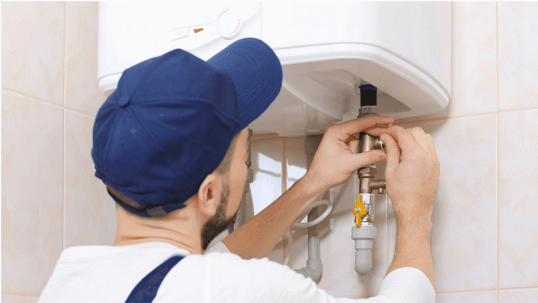Overcoming Everyday Water Heater Troubles
Overcoming Everyday Water Heater Troubles
Blog Article
We have come across this article relating to Common Problems with Tank Water Heaters listed below on the net and figured it made good sense to relate it with you on my blog.

Picture starting your day without your routine hot shower. That already sets a poor tone for the remainder of your day.
Every residence requires a trustworthy water heater, however only a few know just how to take care of one. One very easy method to keep your hot water heater in leading form is to check for faults frequently and also fix them as soon as they show up.
Bear in mind to switch off your water heater prior to sniffing about for faults. These are the hot water heater faults you are more than likely to experience.
Water also hot or also cold
Every hot water heater has a thermostat that identifies just how hot the water gets. If the water entering into your residence is too warm regardless of setting a practical optimum temperature level, your thermostat might be malfunctioning.
On the other hand, also cold water might be because of a stopped working thermostat, a busted circuit, or inappropriate gas flow. For example, if you use a gas water heater with a damaged pilot light, you would get cold water, even if the thermostat is in ideal condition. For electric heating units, a blown fuse may be the culprit.
Insufficient hot water
Hot water heater can be found in several dimensions, depending on your hot water needs. If you lack hot water prior to every person has had a bath, your hot water heater is as well tiny for your family size. You must consider mounting a bigger water heater storage tank or opting for a tankless hot water heater, which takes up much less space as well as is more long lasting.
Strange sounds
There go to the very least 5 kinds of sounds you can hear from a water heater, yet the most common interpretation is that it's time for the water heater to retire.
First of all, you should know with the regular seems a water heater makes. An electric heater might seem different from a gas-powered one.
Popping or banging audios normally imply there is a piece of sediment in your tanks, and also it's time to cleanse it out. On the other hand, whistling or hissing sounds might simply be your shutoffs letting some stress off.
Water leaks
Leakages might originate from pipelines, water connections, shutoffs, or in the worst-case situation, the container itself. In time, water will certainly corrode the container, and discover its escape. If this happens, you require to replace your hot water heater as soon as possible.
Nevertheless, prior to your adjustment your entire tank, make sure that all pipelines remain in place and that each valve works perfectly. If you still need assistance recognizing a leakage, call your plumber.
Rust-colored water
Rust-colored water suggests one of your water heater components is corroded. It could be the anode rod, or the tank itself. Your plumber will certainly have the ability to determine which it is.
Warm water
Regardless of exactly how high you set the thermostat, you won't get any kind of warm water out of a heating system well past its prime. A hot water heater's effectiveness might minimize with time.
You will certainly likewise get warm water if your pipelines have a cross connection. This means that when you turn on a tap, warm water from the heating unit streams in along with normal, cold water. A cross connection is simple to area. If your warm water faucets still follow closing the water heater shutoffs, you have a cross connection.
Discoloured Water
Rust is a significant root cause of dirty or discoloured water. Deterioration within the water tank or a falling short anode pole could trigger this discolouration. The anode rod protects the storage tank from rusting on the within and need to be checked yearly. Without a pole or a correctly operating anode rod, the hot water swiftly rusts inside the container. Call a professional water heater professional to determine if replacing the anode rod will take care of the issue; otherwise, change your hot water heater.
Conclusion
Ideally, your hot water heater can last one decade prior to you require an adjustment. Nonetheless, after the 10-year mark, you may experience any one of these mistakes extra consistently. Now, you need to include a brand-new water heater to your spending plan.
How To Troubleshoot 3 Common Water Heater Problems in Twin Cities
The Water Heater Is Leaking
A leaky cold water inlet valve A loose pipe fitting A leaky temperature and pressure relief valve A corroded anode rod A cracked tank Turn Off Your Water Heater:
Shut off your gas water heater by turning the gas valve on the unit to the “OFF” position. Shut off your electric water by switching its power off at your electrical panel. Look for a two-pole breaker labeled “water heater” and turn it to the “OFF” position. Move the ball valve connected to the water heater to be perpendicular to the piping at a 90° angle. Look for the Leak:
Depending on whether the water is coming from the tank's top or bottom, you’ll want to look for the leak in different locations.
If the leak comes from the top of the tank, carefully look for water escaping from the cold water inlet valve or loose pipe fittings. Rusted hot and cold water valves can have loose connections with the tank, with water leaking out of them.
https://mspplumbingheatingair.com/blog/how-to-troubleshoot-3-common-water-heater-problems
I am very taken with Water Heaters Problems and I hope you enjoyed the blog entry. If you please set aside a second to share this content if you appreciated it. We recognize the value of reading our article about Common Problems with Your Home Water Heater.
Secure fix? Ring! Report this page